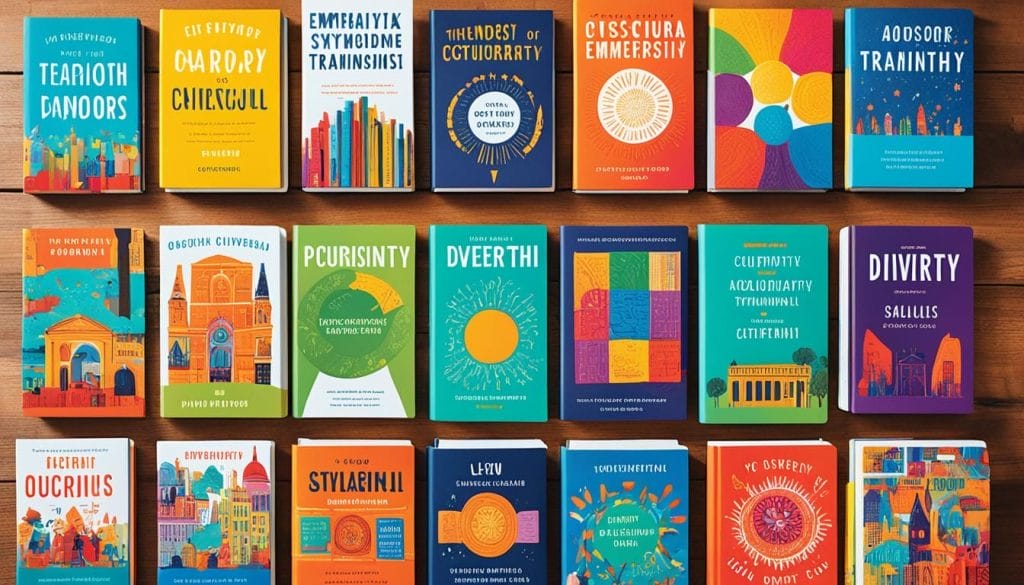The business benefits of diversity, equity, and inclusion (DEI) in the workplace are well documented. Did you know that organizations with a diverse workforce are 35% more likely to outperform their competitors? To effectively implement DEI strategies, leaders can turn to diversity training books. These books offer practical advice and in-depth insights into the keys to effective DEI strategies, providing a guide that can be referenced when faced with DEI challenges. They cover topics such as race, gender, age, physical ability, religion, and sexual orientation, fostering a more inclusive and equitable environment.
Key Takeaways:
- Diversity training books provide practical advice for implementing DEI strategies.
- These books cover a range of topics, including race, gender, and physical ability.
- Organizations with diverse workforces are more likely to outperform their competitors.
- Effective diversity training fosters a more inclusive and equitable workplace.
- By investing in diversity training, organizations can promote growth and productivity.
The Inclusive Language Handbook by Jackie Ferguson and Roxanne Bellamy
“The Inclusive Language Handbook” by Jackie Ferguson and Roxanne Bellamy is a top-selling guide that helps professionals navigate discussions about human diversity and identity in the workplace. This comprehensive book provides best practices for using respectful language that promotes inclusion, productivity, and teamwork.
The authors emphasize the significance of understanding and acknowledging the diverse perspectives and experiences of individuals. By utilizing language that is inclusive and affirming, organizations can create a more welcoming and collaborative environment.
The Inclusive Language Handbook offers various resources to facilitate learning and growth. Quizzes, exercises, and thought-provoking questions enable readers to actively engage with the material and apply it to real-world scenarios. This interactive approach encourages individuals to develop a deeper understanding of the impact language has on fostering inclusivity.
The book also offers valuable insights on implementing inclusive language practices throughout organizations and communities. By spreading awareness and understanding, professionals can contribute to positive culture change and create environments where everyone feels valued and respected.
By incorporating the teachings from “The Inclusive Language Handbook” into diversity training for employees, organizations can enhance their diversity, equity, and inclusion efforts, leading to improved teamwork, employee satisfaction, and overall organizational success.
Lead Like an Ally by Julie Kratz
“Lead Like an Ally” by Julie Kratz is an effective diversity training book that offers invaluable leadership strategies for attracting and retaining diverse talent, leading inclusively, and driving positive organizational change. Kratz’s book provides actionable insights and tools that empower leaders to create a more diverse and equitable workplace.
One of the standout features of “Lead Like an Ally” is the comprehensive toolkit and checklist it includes. This toolkit provides leaders with practical resources they can immediately implement to promote diversity and inclusion within their organizations.
Kratz’s personal experience navigating challenges faced by women in corporate America adds an authentic and relatable perspective to the book. Her insights provide guidance on how to effectively navigate and address the unique barriers and biases that women often encounter in the workplace.
An important aspect of “Lead Like an Ally” is its emphasis on the role of allies in fostering diversity and inclusion. Kratz highlights the importance of allies in advocating for underrepresented groups and creating a more equitable work environment.
Furthermore, Kratz’s book encourages leaders to challenge their own biases and assumptions, promoting self-reflection and personal growth. By examining their own beliefs and behaviors, leaders can become more effective allies and champions for diversity and equity.
“Lead Like an Ally” offers practical strategies for leaders to create a culture of inclusivity by leveraging their influence and privilege. It provides guidance on identifying and overcoming systemic barriers, engaging in courageous conversations, and championing diversity and equity initiatives within organizations.
As leaders continue to prioritize diversity, equity, and inclusion, “Lead Like an Ally” serves as a valuable resource and guide. It equips leaders with the necessary tools, knowledge, and mindset to drive positive change and create a more inclusive work environment.
For a deeper understanding of the importance of inclusive leadership, check out the insightful article here.
Key Takeaways from “Lead Like an Ally”
- Implement actionable strategies for attracting and retaining diverse talent
- Drive positive organizational change by leading inclusively
- Utilize the comprehensive toolkit and checklist for immediate implementation
- Navigate and address the unique challenges faced by women in corporate America
- Embrace the role of allies in fostering diversity and inclusion
- Promote self-reflection and personal growth to challenge biases
Leading Global Diversity, Equity and Inclusion by Rohini Anand
“Leading Global Diversity, Equity and Inclusion” by Rohini Anand is a comprehensive guide that delves into the integration of diversity, equity, and inclusion (DEI) initiatives across diverse countries and cultures. This book draws from the author’s extensive experience directing global DEI efforts, as well as interviews with over 65 business leaders worldwide. Through a combination of real-world examples and practical strategies, Anand emphasizes the importance of considering local histories, laws, and practices when implementing DEI strategies.
The five proven principles outlined in “Leading Global Diversity, Equity and Inclusion” provide organizations with a roadmap for creating inclusive environments that celebrate diversity and promote equality. By examining the unique challenges and opportunities presented by different cultures, this book equips leaders with the tools they need to foster DEI success on a global scale.
“Considering local histories, laws, and practices is essential for effective DEI initiatives in today’s interconnected and diverse world. ‘Leading Global Diversity, Equity and Inclusion’ offers actionable insights for organizations navigating the complex landscape of global diversity.”
Key topics covered in the book include:
- The impact of culture on diversity and inclusion initiatives
- Strategies for developing culturally competent leadership
- Integrating DEI practices into global talent acquisition and retention
- Creating inclusive policies and practices that respect local values
- Nurturing cross-cultural collaboration and communication
Through her research and expertise, Anand offers a holistic perspective on how organizations can build inclusive cultures that recognize and embrace diversity in all its forms. “Leading Global Diversity, Equity and Inclusion” serves as a vital resource for companies seeking to champion DEI on a global scale, fostering engagement, innovation, and equality within their respective organizations.
Ally Up: The Definitive Guide to Building More Inclusive, Innovative and Productive Teams by Di Ciruolo

In today’s diverse workplaces, developing strong allies is crucial for promoting inclusivity and equality. “Ally Up” by Di Ciruolo is a comprehensive guide that addresses the critical need for allyship in the business community. With the underrepresentation of diverse individuals in executive positions, it is vital for all employees to understand how to leverage their privilege and support marginalized colleagues.
This insightful book shares eye-opening stories and provides practical strategies for leveraging allyship to address workplace inequalities and create inclusive, high-performing teams. Ciruolo emphasizes the importance of active engagement, empathy, and self-reflection in becoming effective allies.
Through a combination of personal experiences, research-backed insights, and actionable advice, “Ally Up” offers guidance on how to:
- Recognize and challenge biases and stereotypes
- Promote equitable decision-making processes
- Advocate for inclusive practices within your organization
- Stand up against discrimination and microaggressions
- Build authentic relationships across diverse backgrounds
“Ally Up” is a valuable resource for individuals seeking to create positive change within their organizations. By understanding the power of allyship and implementing its principles, teams can foster an environment where everyone feels seen, heard, and valued.
Key Takeaways from “Ally Up”
- Understanding the Impact of Privilege: The book explores the concept of privilege and its role in perpetuating inequities. It encourages readers to reflect on their own privileges and leverage them to uplift others.
- Effective Allyship Strategies: “Ally Up” provides practical strategies for becoming an effective ally, including active listening, amplifying marginalized voices, and using one’s influence to create inclusive spaces.
- Creating Inclusive Teams: The book offers insights into fostering diversity, equity, and inclusion within teams by creating a psychologically safe environment, promoting collaboration, and embracing diverse perspectives.
- Addressing Unconscious Bias: Ciruolo delves into the topic of unconscious bias and provides tools for recognizing and mitigating bias in the workplace. By addressing bias head-on, teams can work towards a more inclusive and equitable culture.
Whether you are an executive, manager, or individual contributor, “Ally Up” equips you with the knowledge and skills necessary to be an effective ally and create positive change. By aligning with the principles outlined in this book, organizations can foster a culture of inclusivity and innovation.
Inclusive 360: Proven Solutions for an Equitable Organization by Bernadette Smith
“Inclusive 360” by Bernadette Smith offers a comprehensive guide for organizations looking to build a more diverse, equitable, and inclusive workplace. This book presents inspiring ideas from innovative global companies and provides practical solutions that can be customized for any organization.
The key message of “Inclusive 360” is that creating an equitable organization requires the collective effort of every department. It emphasizes the importance of aligning policies, practices, and systems to foster a culture of inclusivity. The book provides practical advice and actionable strategies for organizations to move from good intentions to meaningful action.
One of the strengths of “Inclusive 360” is its focus on real-life examples and case studies. Bernadette Smith draws on her extensive experience working with organizations and shares success stories from companies that have successfully implemented diversity and inclusion initiatives. These examples provide readers with a deeper understanding of how to overcome challenges and drive positive change.
This book covers a wide range of topics, including unconscious bias, equitable hiring practices, promoting diversity at leadership levels, and creating inclusive spaces for all employees. By addressing these critical areas, “Inclusive 360” helps organizations develop a holistic approach to diversity and inclusion.
With its practical insights and actionable strategies, “Inclusive 360” serves as a valuable resource for HR professionals, managers, and leaders committed to creating a more diverse, equitable, and inclusive work environment.
| Pros | Cons |
|---|---|
| Provides actionable strategies for organizations | Requires commitment from all departments |
| Includes real-life examples and case studies | May require additional resources to implement |
| Addresses a wide range of diversity and inclusion topics | Requires ongoing evaluation and adaptation |
“Inclusive 360” is an essential read for organizations that are serious about building a more equitable and inclusive workplace. By leveraging the insights and strategies shared in this book, organizations can create positive and lasting change that benefits employees, customers, and the bottom line. Get your copy of “Inclusive 360” to embark on a transformative journey towards equity and inclusion.
Click here to learn more about The Equality Institute, a leading provider of diversity training and inclusion resources.
We Can’t Talk About That at Work! by Mary-Frances Winters

“We Can’t Talk About That at Work!” by Mary-Frances Winters is a compelling diversity training book that provides professionals with valuable insights on how to navigate potentially sensitive topics in the workplace. The book offers guidance on structuring constructive conversations about politics, religion, and race, allowing individuals to engage in open and respectful dialogue.
In today’s diverse and multicultural workplaces, it is essential to have the skills to communicate effectively with colleagues from different backgrounds. “We Can’t Talk About That at Work!” equips professionals with the necessary tools and exercises to engage in meaningful conversations that challenge biases and stereotypes.
The book emphasizes the importance of fostering inclusive conversations that promote understanding, empathy, and collaboration. By addressing potentially contentious issues head-on, organizations can create a culture of respect and inclusion, mitigating conflict and strengthening relationships among employees.
“Creating an environment where sensitive topics can be discussed openly is key to promoting diversity and inclusion in the workplace. ‘We Can’t Talk About That at Work!’ provides practical guidance for professionals to navigate these conversations with sensitivity, empathy, and mutual respect.” – Mary-Frances Winters
In addition to offering strategies for effective communication, “We Can’t Talk About That at Work!” highlights the broader benefits of inclusive conversations for organizational growth. By encouraging open dialogue, organizations can tap into the diverse perspectives and experiences of their employees, fostering innovation, creativity, and collaboration.
By incorporating the principles outlined in “We Can’t Talk About That at Work!” into their daily interactions, professionals can contribute to a more inclusive and equitable workplace. The book serves as a valuable resource for individuals seeking to enhance their diversity training and communication skills, ultimately building stronger and more cohesive teams.
Dive deeper into the importance of open conversations and diversity training in workplaces.
| Key Points | Benefits |
|---|---|
| Provides guidance on discussing sensitive topics | Promotes understanding and empathy |
| Equips professionals with tools for effective communication | Fosters collaboration and teamwork |
| Challenges biases and stereotypes | Drives innovation and creativity |
| Creates a culture of respect and inclusion | Strengthens relationships among employees |
Underestimated: A CEO’s Unlikely Path to Success by Donald Thompson
“Underestimated” by Donald Thompson is an inspiring memoir that chronicles the remarkable journey of a Black man who defied the odds and achieved tremendous success as a tech entrepreneur and CEO. Throughout the book, Thompson shares his personal experiences, highlighting the challenges and barriers he encountered along the way.
Thompson’s story serves as an empowering reminder that determination, resilience, and unwavering belief in oneself can overcome even the most daunting challenges. His journey to success provides valuable insights and lessons for individuals facing similar obstacles and seeking to break through societal and professional barriers.
“Underestimated” showcases the power of diversity and inclusion in the business world. Thompson’s journey demonstrates the immense value that individuals from diverse backgrounds bring to organizations and the limitless potential that can be unlocked when inclusive opportunities are provided.
By sharing his story, Thompson inspires readers to embrace their unique identities and leverage their strengths to create opportunities for themselves and others. His book reignites the flame of ambition, motivates individuals to pursue their dreams, and encourages businesses to prioritize diversity, equity, and inclusion.
Don’t Ask the Blind Guy for Directions: A 30,000-Mile Journey for Love, Confidence and a Sense of Belonging by John Samuel

“Don’t Ask the Blind Guy for Directions” by John Samuel is a powerful memoir that chronicles the author’s remarkable journey in search of love, confidence, and a sense of belonging after being diagnosed with a degenerative eye disease. This heartfelt book offers readers a unique perspective on disability and the challenges faced by individuals with disabilities as they navigate through life and strive to create inclusive cultures.
John Samuel’s gripping storytelling takes readers on a 30,000-mile journey filled with emotional highs and lows. Through his experiences, Samuel addresses the importance of diversity and equity in organizations, shedding light on the need for understanding and support for professionals with disabilities. His narrative offers valuable insights for individuals with disabilities who are seeking empowerment and inspiration in their personal and professional lives.
This book is particularly relevant for those working towards diversity and inclusion in organizations. By sharing his story, Samuel encourages readers to challenge preconceived notions, overcome barriers, and strive for a more inclusive society. Through personal anecdotes and deep reflections, he invites readers to rethink their perspectives and consider the unique contributions that individuals with disabilities can make in the workplace.
Key Takeaways from “Don’t Ask the Blind Guy for Directions”:
- Insights into the challenges faced by individuals with disabilities in creating inclusive cultures
- Emphasis on the importance of diversity and equity in organizations
- Empowerment and inspiration for professionals with disabilities seeking personal and professional growth
- Understanding the unique contributions that individuals with disabilities can bring to the workplace
In conclusion, “Don’t Ask the Blind Guy for Directions” by John Samuel offers a powerful and enlightening perspective on disability, diversity, and inclusion. This book serves as a reminder of the importance of creating inclusive environments that embrace the talents and experiences of all individuals.
| Book | Author | Key Themes |
|---|---|---|
| “Don’t Ask the Blind Guy for Directions” | John Samuel | Disability, Diversity, Inclusion, Personal Growth |
Inside Out: The Equity Leader’s Guide to Undoing Institutional Racism by Caprice D. Hollins
“Inside Out” by Caprice D. Hollins is a powerful leadership guide that offers practical advice and strategies for building antiracist organizations. The book delves into the complexities of power dynamics, microaggressions, and difficult interactions that perpetuate institutional racism. By addressing these issues head-on, leaders can create spaces where everyone feels a sense of belonging.
Hollins provides valuable tools and checklists to help organizations navigate the challenges of undoing institutional racism. The book encourages open and honest discussions about race and offers guidance on how to foster racial healing and cultivate equality within the workplace.
This resource is particularly valuable for organizations seeking to create a more inclusive and equitable environment. It provides actionable steps and discussion questions to support dialogue and change. By implementing the insights from “Inside Out,” organizations can take meaningful steps towards dismantling systemic racism.
“The greatest journey towards equity may be an inside job. Paddle, don’t race, with patience.” – Caprice D. Hollins
Included in the book are thought-provoking quotes, case studies, and real-life examples that illustrate the impact of institutional racism. Hollins emphasizes the importance of personal reflection, ongoing learning, and active allyship in the fight against racism.
If you’re looking for a comprehensive guide to dismantling institutional racism and achieving equity within your organization, “Inside Out” is an invaluable resource that offers practical guidance, actionable steps, and a roadmap for building a more inclusive future.
For further resources on diversity, equity, and inclusion, explore this curated list of diversity and inclusion speakers who can provide valuable insights and expertise.
Conclusion
Diversity training books are essential resources for promoting inclusive growth and building cultural competency within organizations. The carefully curated list of top diversity training books featured in this article provides valuable insights and practical strategies for navigating the challenges of diversity, equity, and inclusion (DEI). By investing time in reading and applying the wisdom found in these books, professionals can enhance their skills as managers, coworkers, allies, and advocates in creating a more inclusive and equitable work environment.
These top diversity training books offer guidance on topics such as race, gender, age, physical ability, religion, and sexual orientation with respect and compassion. They provide practical advice, exercises, and communication techniques to help professionals effectively implement DEI strategies and foster positive change. Whether leaders in the workplace or individuals seeking personal growth, these books empower readers to become better equipped in addressing DEI challenges and championing inclusion.
With a greater understanding of diverse perspectives and experiences, professionals can create an environment where everyone feels valued and heard. By embracing the knowledge gained from these diversity training books, organizations can foster an inclusive work culture that celebrates diversity, supports equity, and promotes the full participation of individuals from all backgrounds.
FAQ
What are diversity training books?
Diversity training books are resources that provide practical advice and insights into diversity, equity, and inclusion (DEI) strategies in the workplace. They offer guidance on navigating topics such as race, gender, age, physical ability, religion, and sexual orientation, and promote a more inclusive and equitable environment.
Why are diversity training books important?
Diversity training books are important because they help professionals understand the business benefits of DEI and provide strategies for effectively implementing DEI initiatives. They offer practical advice, exercises, and communication techniques that promote respectful and inclusive conversations about sensitive topics. These books empower individuals to become better leaders, coworkers, and allies in creating a more inclusive work environment.
What topics do diversity training books cover?
Diversity training books cover a range of topics related to DEI, including inclusive language, leadership strategies, global DEI initiatives, allyship, building inclusive organizations, difficult conversations, overcoming barriers, navigating disabilities, and addressing racism in institutions.
How can diversity training books benefit organizations?
Diversity training books can benefit organizations by fostering inclusive growth, cultural competency, and equitable practices. They provide valuable insights and strategies that help organizations attract and retain diverse talent, drive positive change, and create a more inclusive work environment for all employees.
Which book is recommended for learning about inclusive language?
“The Inclusive Language Handbook” by Jackie Ferguson and Roxanne Bellamy is recommended for learning about inclusive language. It provides best practices for using respectful language that promotes inclusion, productivity, and teamwork in the workplace. The book offers quizzes, exercises, and thought-provoking questions to aid the learning process.
What book provides leadership strategies for leading inclusively?
“Lead Like an Ally” by Julie Kratz provides valuable leadership strategies for leading inclusively. It offers insights on attracting and retaining diverse talent, driving positive organizational change, and navigating challenges faced by women in corporate America. The book includes a comprehensive toolkit and checklist for immediate implementation.
Are there any books that focus on global DEI initiatives?
Yes, “Leading Global Diversity, Equity and Inclusion” by Rohini Anand explores five proven principles for successfully integrating DEI initiatives across multiple countries and cultures. The book emphasizes the importance of considering local histories, laws, and practices when implementing DEI strategies. It offers valuable insights from interviews with business leaders worldwide and the author’s own experience directing global DEI efforts.
Which book highlights the importance of allyship in the business community?
“Ally Up” by Di Ciruolo highlights the critical need for allyship in the business community. It addresses the underrepresentation of diverse individuals in executive positions and provides a guide for leveraging allyship to address workplace inequalities and create inclusive, high-performing teams.
Is there a book that offers practical advice for building a more diverse and inclusive organization?
Yes, “Inclusive 360” by Bernadette Smith offers a roadmap for building a more diverse, equitable, and inclusive organization. The book includes inspiring ideas from innovative global companies that can be adapted for any organization. It emphasizes the role of every department in creating an equitable workplace and provides practical advice for moving from intention to action.
Are there any books that focus on having constructive conversations about sensitive topics?
Yes, “We Can’t Talk About That at Work!” by Mary-Frances Winters teaches professionals how to structure constructive conversations about potentially sensitive topics like politics, religion, and race. The book offers exercises and tools for communicating with people from different cultures and confronts biases and stereotypes. It emphasizes the importance of inclusive conversations in mitigating conflict and strengthening organizations.
Are there any books that share personal experiences of overcoming challenges and barriers?
Yes, “Underestimated” by Donald Thompson shares the inspiring life story of a Black man who overcame challenges and barriers to become a successful tech entrepreneur and CEO. The book offers valuable insights into overcoming barriers and realizing one’s dreams, providing inspiration and motivation for individuals facing similar challenges.
Is there a book that addresses the experiences of individuals with disabilities in the workplace?
Yes, “Don’t Ask the Blind Guy for Directions” by John Samuel chronicles the author’s journey in search of belonging after a diagnosis of a degenerative eye disease. The book empowers readers by sharing the experiences of someone with a disability as they navigate creating inclusive cultures. It offers insights for professionals with disabilities and those working towards inclusivity in organizations.
Which book provides a leadership guide for building antiracist organizations?
“Inside Out” by Caprice D. Hollins provides a leadership guide for building antiracist organizations. The book addresses power dynamics, microaggressions, and difficult interactions and offers practical advice, checklists, and discussion questions. It is a valuable resource for organizations seeking to cultivate racial healing and equality.
How can diversity training books contribute to inclusive growth and cultural competency?
Diversity training books play a crucial role in fostering inclusive growth and cultural competency in organizations. They offer practical strategies, insights, and exercises that help professionals navigate DEI challenges, creating a more inclusive and equitable work environment. By reading and applying the wisdom from these books, professionals can become better managers, coworkers, allies, and advocates for DEI.





